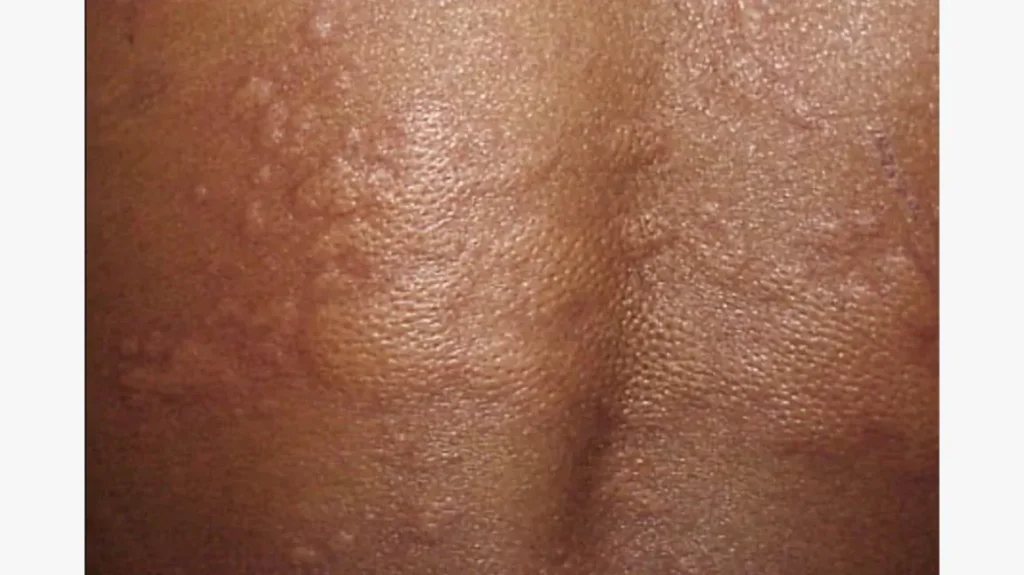Author's details
- Hakim A Abubakre
- BA (Hons) International Business Management, Msc Digital Marketing.
Reviewer's details
- Dr. Khashau Eleburuike
- MBBS (Ilorin) MSc. Global Health Karolinska Institute.
- Resident doctor in family medicine in Northen Sweden.

- Date Published: 2025-06-03
- Date Updated: 2026-01-02
Urticaria (Hives)
Key Messages
- Urticaria (hives) causes itchy, raised skin bumps or swelling and is triggered by inflammation from histamine release.
- Common triggers include infections, foods, medications, insect bites, allergens, temperature changes, and stress.
- Seek urgent medical help if swelling affects the face or throat, or if there are breathing difficulties.
- Self-care includes using cold compresses, antihistamines, mild soaps, and avoiding known triggers.
- Urticaria is not a curse or contagious; support affected individuals and encourage medical care.
What is Urticaria?
Urticaria, commonly known as hives, is a skin condition that causes itchy, raised bumps (wheals) or swelling under the skin (angioedema). It is a result of inflammation in the skin triggered by the release of chemicals like histamine from immune cells called mast cells.
It affects around 20% of people worldwide at some point. While often harmless, it can cause significant discomfort, especially when persistent.
Types of Urticaria
| Type | Description |
|---|---|
| Acute Urticaria | It lasts less than or exactly 6 weeks. Common causes include infections, food, or medications. |
| Chronic Spontaneous Urticaria | Lasts over 6 weeks. No clear trigger. May involve the immune system (autoantibodies). |
| Chronic Inducible Urticaria | Triggered by specific physical factors like heat, cold, pressure, or sunlight. |
| Angioedema | Deep swelling under the skin, especially around the eyes, lips, hands, feet, or throat. May accompany hives or occur alone. |
What Causes Urticaria?
Triggers vary but may include:
- Infections (malaria, typhoid, worms, colds)
- Foods (e.g., groundnuts, eggs, seafood, or local herbal drinks)
- Medications (painkillers like ibuprofen, antibiotics like penicillin)
- Insect bites or stings
- Allergens (new soaps, laundry detergents, perfumes)
- Heat, sunlight, or cold exposure
- Stress or anxiety
- Vitamin D deficiency or autoimmune conditions
- Traditional or herbal remedies
Symptoms and Warning Signs
- Raised itchy bumps (red, skin-colored, or darker on pigmented skin)
- The central part of the rash turns pale when pressed
- Swelling under the skin (angioedema)
- Painful puffiness of lips, eyes, or throat
- Hives that appear after exercise, hot baths, or stress
- Symptoms persisting for more than 6 weeks
- Recurring flare-ups over months or years
In darker skin, hives may not appear red but will feel raised and itchy.
When to Seek Medical Help
Go to the clinic or hospital urgently if:
- Swelling affects your face, tongue, lips, throat, or airways
- You have trouble breathing or speaking
- You feel lightheaded, faint, or have chest tightness
- You're vomiting, having tummy pain, or a high fever
- Rash is worsening or spreading
- Hives return repeatedly or last more than 6 weeks
- Symptoms interfere with sleep, work, school, or daily activities
Self-Care Tips
- Apply a cold compress to relieve itching
- Use anti-itch creams or take antihistamines (as prescribed)
- Bathe with lukewarm water and colloidal oatmeal if available
- Use fragrance-free soaps and creams
- Wear loose-fitting, cotton clothing
- Avoid scratching—clip fingernails short
Prevention Tips
- Avoid known food triggers (e.g., ground nuts, seafood)
- Keep your environment free from dust, smoke, and insect bites
- Use mild, unscented soaps and detergents
- Avoid extreme temperatures, hot sun or cold baths
- Manage stress with rest, prayer, meditation, or talking with someone
- Keep a symptom diary to track triggers
Urticaria and Sub-Saharan Africa
While urticaria is a common condition globally, it is underreported and poorly studied in many African countries. Often, it may be misinterpreted as spiritual attacks or poisoning, especially in rural areas. Education is key—urticaria is a medical condition, not a curse or witchcraft.
Due to limited healthcare access and awareness, many people rely on traditional remedies, some of which may worsen symptoms. Seek care at primary health centers or dermatology clinics if possible.
FAQs
Q: Is urticaria contagious?
A: No, hives are not infectious.
Q: Can traditional medicine help?
A: Some herbal remedies may soothe the skin, but others can trigger reactions. Always test on a small area and consult a health worker.
Q: Can children get urticaria?
A: Yes, it is common in children and often linked to infections or food.
Q: Does it go away completely?
A: Acute cases resolve quickly. Chronic cases may last months or years but can be controlled.
Key Messages for Families and Communities
- Urticaria is not a curse. It is a medical reaction often caused by infections, food, or allergies.
- Do not isolate the person. Offer support and help them avoid triggers.
- Encourage affected individuals to seek medical help, especially if symptoms are persistent or serious.
- Avoid applying unknown traditional substances to the skin without medical advice.
- Zuberbier, T., et al. (2021). The EAACI/GA²LEN/EuroGuiDerm/APAAACI Guideline for Urticaria. Allergy.
- Akinboro, A.O., et al. (2018). Urticaria in Nigeria: Patterns and Management Challenges. Nigerian Journal of Clinical Practice.
- Day, C. and Peter, J., 2025. Chronic Urticaria in Africa, What We Know and What We Do Not: A Systematic Review. Current Treatment Options in Allergy, 12(1), p.2.
- Reynertson KA, Garay M, Nebus J, Chon S, Kaur S, Mahmood K, Kizoulis M, Southall MD. Anti-inflammatory activities of colloidal oatmeal (Avena sativa) contribute to the effectiveness of oats in treatment of itch associated with dry, irritated skin. J Drugs Dermatol. 2015 Jan;14(1):43-8. PMID: 25607907.
- Kolkhir, P., Giménez-Arnau, A.M., Kulthanan, K., Peter, J., Metz, M. and Maurer, M., 2022. Urticaria. Nature Reviews Disease Primers, 8(1), p.61.
- Mayo Clinic. (2023). Urticaria: Causes, Symptoms, and Treatment.
- South African Dermatology Society. (2022). Urticaria Treatment Guidelines.
- WHO. (2022). Primary Care Guidelines for Skin Disorders in Low-Resource Settings.
